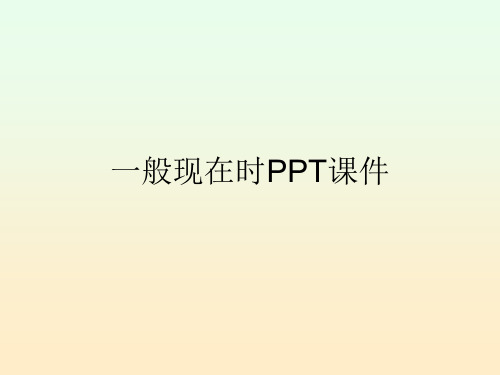一般现在时(复习)课件
合集下载
《一般现在时》PPT课件

一、Language focus 描述发展趋势——名词、动词、形、副、 现在完成时 连接词but 和so 描述家庭生活和关系 二、描述发展趋势——名、动、形、副 1. 描述发展趋势——名、动、形、副可观课 本 Activity 1 P38
n. A rise An increase
V. to go up to increase to rise V. to decline to decrease to go down to fall
}
Exercise:
Activity 5 Workbook Activity 7
5.复习一般过去时 一般过去时常用于表示过去某一时间或过去一段时期内发生的事件 或动作 When I was little girl, my brothers and I collected stamps for many years. 6.复习过去进行时 过去进行时表示用于描述过去某一时刻或过去某阶段正在进行的动作 As we burst in, my mother was standing behind the counter. When we were having lunch, my mother told us an interesting story. 7.一般过去时和过去进行时的疑问句形式 疑问句+did+主+V原+...? 疑问句+was+主+Ving+…..? What were you doing last night? When did she leave ? Exercise : Activity 12 . 13
3.复习现在进行时 构成:be + v. ing 用法:现在进行时用于表示现正在发生蔌 现阶段正在进行的动作。 He is listening to the radio. I am watching TV. 状态动词不用于进行时态。 复习否定式和疑问式再举例。 P4
n. A rise An increase
V. to go up to increase to rise V. to decline to decrease to go down to fall
}
Exercise:
Activity 5 Workbook Activity 7
5.复习一般过去时 一般过去时常用于表示过去某一时间或过去一段时期内发生的事件 或动作 When I was little girl, my brothers and I collected stamps for many years. 6.复习过去进行时 过去进行时表示用于描述过去某一时刻或过去某阶段正在进行的动作 As we burst in, my mother was standing behind the counter. When we were having lunch, my mother told us an interesting story. 7.一般过去时和过去进行时的疑问句形式 疑问句+did+主+V原+...? 疑问句+was+主+Ving+…..? What were you doing last night? When did she leave ? Exercise : Activity 12 . 13
3.复习现在进行时 构成:be + v. ing 用法:现在进行时用于表示现正在发生蔌 现阶段正在进行的动作。 He is listening to the radio. I am watching TV. 状态动词不用于进行时态。 复习否定式和疑问式再举例。 P4
七年级上册一般现在时课件

疑问句型
主语+谓语动词+其他成分
Do you like music?
主语+be动词+其他成分
Is he a doctor?
04
一般现在时的练习
单项选择练习
总结词
考察学生对一般现在时的理解
详细描述
设计包含不同情景和时态的单项选择 题,让学生根据语境选择正确的动词 形式。
翻译练习
要点一
总结词
提升学生语言转换能力
一般现在时的特点
普遍性
一般现在时可以用于描述普遍存在的 现象、事实或规律,例如“The sun rises in the east性的动作 或行为,例如“I get up at 7 o’clock every day.”(我每天7点起床)。
详细描述
例如,当描述“She studies hard”时,学 生可能会错误地写成“She study hard”,
忘记了在动词“study”后面加上“-s”。
忘记使用助动词do/does
总结词
在一般疑问句中,学生常常忘记在动词前加上助动词 “do”或“does”。
详细描述
例如,在句子“Do you like apples?”中,学生可能会错 误地省略助动词“do”,直接写成“You like apples?”。
详细描述
当主语是第三人称单数时,动词需要使用第 三人称单数形式,如“he plays basketball every day”。如果学生忘记这一点,就会 犯主谓不一致的错误,如“he like basketball”。
忘记使用第三人称单数形式
总结词
学生在使用一般现在时时,常常忘记在第三 人称单数主语后加上正确的第三人称单数形 式。
初中英语六种时态复习课件(35张PPT)

②while 引导的从句表示“在……期间”,主从句谓语动词所表示的动 作同时ቤተ መጻሕፍቲ ባይዱ生。这时,主从句都用过去进行时。
e.g.:My father was reading the newspaper while my mother was watching TV.当我的妈妈看电视的时候,我的爸爸正在看报纸。
(2)表示普遍真理或客观事实。 e.g.:The sun rises in the east.太阳从东方升起。 (3)在条件状语从句和时间状语从句中,用一般现在时表示将来。 e.g.:If it doesn't rain tomorrow,we will go for a picnic.如果明天不下 雨,我们将去野餐。 (4)在某些以 here,there 开头的句子中用一般现在时表示正在发生的动作。 e.g.:There goes the bell.铃响了。
(3)现在进行时表示将来 表示位置移动的动词 go,come,leave,fly,start,meet,move 等, 可以用现在进行时表示将要发生的事。 e.g.:We are leaving for London.我们就要动身去伦敦了。
(4)一般现在时表示将来 ①表示按规定或时间表预计要发生的动作。 e.g.:Our plane takes off at 8:10.我们的飞机 8:10 起飞。 ②当主句为一般将来时,或含有情态动词,或是祈使句时,在 if,as soon as,until,when 等引导的状语从句中用一般现在时表示将来。 e.g.:I will give him the book as soon as he comes here.他一来这儿, 我就把这本书给他。
(2)表示当前一段时间内的活动或现阶段正在进行的动作。 e.g.:They are picking apples on a farm all the time.他们一直在农场 摘苹果。 (3)与 always,usually 等词连用,表达说话人强烈的感情,如赞扬、不 满、讨厌等。 e.g.:Mary is always thinking of others instead of herself.玛丽总是为 别人着想,而不为自己着想。
一般现在时ppt课件完整版

不可数名词作主语时,谓语动词用单数 形式。
可数名词单数作主语时,谓语动词也用 单数形式。
例如:Water is essential for life.(水 对生命至关重要。)/ A book is on the table.(一本书在桌子上。)
例外情况总结
当主语为并列主语时,谓语动词的数要与靠近它的主语保持一致。
练习3答案
reads。解析:主语 She 是第三人称单数 ,且时间状语为 on weekends,表示经 常性动作,所以谓语动词要用单数形式 reads。
THANKS
时间状语分类及举例
表示经常性或习惯性的动作
always, usually, often, sometimes
表示现在的状态或特征
now, at present, these days
表示普遍真理或客观事实
in general, as a rule
频率副词分类及举例
01
高频副词
always, constantly, continually
注意区分完全否定和部分否定。完全 否定表示全部否定,而部分否定表示 部分否定。例如,“None of the students passed the exam.”(没 有一个学生通过了考试)是完全否定 ;“Not all of the students passed the exam.”(并非所有学生都通过 了考试)是部分否定。
does he work?等。
动词短语和情态动词的变化规则
03
动词短语中的动词和情态动词后接动词原形,如I can swim,
they often go out等。
02 肯定句结构与用法
主语+动词原形+其他成分
(完整版)一般现在时PPT课件.ppt

7. Tom can not walk fast because he _c_a_r_r_ie_s(carry) a heavy box.
用动词的适当形式填空
1.She ____(go) to school at eight o’clock.
2. He usually _____ up at 17:00.(get )
直接加s
Fly-flies;ห้องสมุดไป่ตู้stay-stays
• 第三节 • 特殊疑问句
• I clean the window at home on Saturdays.
• 1、对主语提问:
• Who cleans the window at home on Saturdays?
• 2、对宾语提问:
Has David got a goal?
7. We have four lessons.(否定句) We don’t have four lessons.
8. Nancy doesn’t run fast (肯定句)
Nancy runs fast. 9. My dog runs fast. 否定句:My dog doesn’t run fast.
5. Danny_s_t_u_d_ie_s__(study) English, Chinese, Maths, Science and Art at school.
6. Mike sometimes g_o__e_s_(go) to the park with his sister.
7. At eight at night, she w__a_tc_hes (watch) TV with his parents. 8. _D_o_e_s_ Mike r_e_a_d_(read) English every day?
七年级一般现在时课件PPT

示例
Do you like apples? 你喜 欢苹果吗?
Am/Is/Are引导的一般疑问句
01
结构
Am/Is/Are + 主语 + 其他?
02
用法
用于询问对方或第三方的身份、特征或状态,其中Am用于第一人称单
数,Is用于第三人称单数和不可数名词,Are用于其他人称和复数。
03
示例
Are they your friends? 他们是你的朋友吗?
用所给动词的适当形式填空
2. My father _______ (work) in a bank. He _______ (go) to work by bus every day.
07
总结回顾与拓展延伸
重点内容回顾
01
02
03
04
一般现在时的定义:表示经常 性、习惯性或普遍性的动作或 状态,以及客观真理或事实。
示例与练习
示例
What do you usually do on weekends? 你周末通常做什 么?
练习
根据所给情境,构造特殊疑问句并给出相应回答。例如,针 对“我昨天去了图书馆”这一情境,可以构造特殊疑问句 “Where did you go yesterday?”并回答“I went to the library yesterday.”。
示例与练习
示例:将陈述句“He likes
playing basketball.”改为一
般疑问句。
01
答案:Does he like playing
basketball?
02
练习:将以下陈述句改为一般
疑问句。
03
She has a new bike.
初中英语一般现在时动词用法课件ppt(36张)
2 一般性的事实或者真理。
The sun rise in the east. 太阳从东方升起 The earth is round. 地球是圆的。
-What do you do?
-What do you do?
-I ...
- I ...
-What do I do?
-What do you do?
I go to school every day.
I do my homework every day.
I go to bed at 9:00.
二、实义动词
Know-point 2
1、实义动词的概念 实义动词,即行为动词,表示动作的动词。
I play basketball.
She wears a beautiful skirt.
三、动词的第三人称单数形式变化规则
1、一般由动词原形加-s walk-walks write-writes like-likes
写出下列词汇的第三人称单数形式:
talk say
______ ______
look __, sh结尾的动词加-es wash- washes watch-watches finish- finishes
—Do you eat every morning? —Yes, I do./No, I don't.
—Does she have a little brother? —Yes, she does./No, she doesn't.
翻译下列句子并作肯定否定回答
1 你们喜欢打篮球吗? 2 他在9点前睡觉吗? 3 Mary 是美国人吗?
It is a dog.
They are scientists.
2024年中考英语语法复习——一般现在时课件
studies
★以y结尾的单词,但y之前有元音字母时, 直接加s,如:say→says,pay→pays等。
★be 动词的第三人称单数是is。
★have的第三人称单数为has。
2)He/She/It does...的不同句式
① 一般疑问句:Does he/she/it (do)...?
陈述句:He goes to school every day.他每天去学校。 一般疑问句:Does he go to school every day?他每天去学校吗?
b.针对地点提问
Where does he draw? 他在哪里画画?
Where does your brother play games? 你弟弟在哪里玩游戏?
c.针对方式提问 How does she go to school? 她是怎么去学校的? How does he get to the airport? 他是怎么到达机场的? d.针对时间提问 When does Danny get up? 丹尼是几点起床的? What time does your father go to work? 你父亲几点上班?
(这里的run,go,see 就是实义动词,在句 中用原形。)
2.一般疑问句:Do you...?
陈述句:I see the rainbow.我看见彩虹 一般疑问句:Do you see the rainbow?你看到彩虹了吗?
陈述句:Ilike myjourney.我喜欢这次旅行。 一般疑问句:Doyou like your journey?你喜欢你这次旅行吗?
be动词在一般现在时态中的各种句型:
1.肯定句:主语+be+其他
You are a good girl. 你是一个好女孩。
★以y结尾的单词,但y之前有元音字母时, 直接加s,如:say→says,pay→pays等。
★be 动词的第三人称单数是is。
★have的第三人称单数为has。
2)He/She/It does...的不同句式
① 一般疑问句:Does he/she/it (do)...?
陈述句:He goes to school every day.他每天去学校。 一般疑问句:Does he go to school every day?他每天去学校吗?
b.针对地点提问
Where does he draw? 他在哪里画画?
Where does your brother play games? 你弟弟在哪里玩游戏?
c.针对方式提问 How does she go to school? 她是怎么去学校的? How does he get to the airport? 他是怎么到达机场的? d.针对时间提问 When does Danny get up? 丹尼是几点起床的? What time does your father go to work? 你父亲几点上班?
(这里的run,go,see 就是实义动词,在句 中用原形。)
2.一般疑问句:Do you...?
陈述句:I see the rainbow.我看见彩虹 一般疑问句:Do you see the rainbow?你看到彩虹了吗?
陈述句:Ilike myjourney.我喜欢这次旅行。 一般疑问句:Doyou like your journey?你喜欢你这次旅行吗?
be动词在一般现在时态中的各种句型:
1.肯定句:主语+be+其他
You are a good girl. 你是一个好女孩。
人教版(PEP)小学英语五年级上册期末复习课件ppt---一般现在时(共42张PPT)
重点
有be用___b__e___,有情用 __情_____,无be无情请求 __助________ (___d__o___、 __d__o_e_s__) 。
时态句式
肯定句
否定句 疑问句
not “不”
一般疑问句 特殊疑问句
Yes,… No,…
特殊疑问词提问 What,Where…
Bonus time
放在be动词的__后_面___
notes
常见结构
I like sleeping very much. 1. 非第三人称单数主语+__V_原____
注意:常见的非第三人称单数主语有:
__I____,__w_e___,_y__o_u__,_t_h_e_y__, my friends,the farmers…
Make sentence
they usually
the students every day
常见结构
He makes a card after class. 2. 第三人称单数主语+_V__-_s_/_V_-__e_s (动词
_第__三__人___称__单__数______形式)
注意:常见的第三人称单数主语有:
无be无情请求助(do, does)
He reads books every day. 否定句:He __d_o_e_sn_’_t __r_e_a_d__ books every day. 一般疑问句: __D_o_e_s ___h_e_ _r_e_a_d__ books every day? 肯否回答: Yes, he does./ No, he doesn’t. 特殊疑问句: ____W__h_a_t ___d_oe_s___he _d_o___ every day?
2025年中考英语一般现在时复习课件(共21张PPT)
+_s_ walk—walks 将_y_改为 _i_+_e_s_ fly—flies
+_e_s_ watch—watches
一些以__o__结尾的动词
+_e_s_
have的第三人称单数为has
go—goes do—does
练一练
come-- comes go-- goes stay-- stays teach-- teaches eat-- eats fish-- fishes fix-- fixes discuss-- discusses do-- does fly-- flies have-- has play-- plays study-- studies work-- works finish-- finishes
e.g. He is not (isn’t)a worker. You are not (aren’t) thirteen. They are not (aren’t) in the classroom.
一、 be 动词的一般现在时的句式
一般疑问句:Be+ _主__语___+ _其__它___?
e.g. Is he a worker?
0%
never 从未
一般现在时态的基本句式:
一、 be 动词的一般现在时的句式:
肯定句:_主__语__+_b__e_+表语(n., adj. ,num.等)
e.g. He is a worker. You are thirteen. They are in the classroom.
否定句:_主__语___+_b__e_+ _n_o_t_+表语
我每天骑自行车上学。
